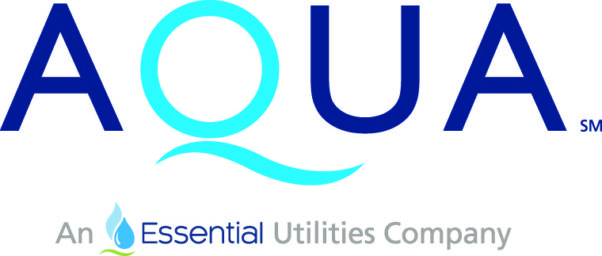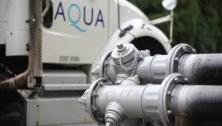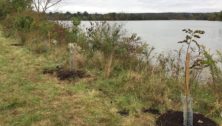Emergency Preparedness at Aqua Pennsylvania Is the Order of the Day


Editor’s Note: This is the fourth in a five-part series by Aqua Pennsylvania that highlights different aspects of the company, including its history, background on infrastructure upgrades, environmental impact, and future growth opportunities.
Part of what makes a utility a utility, as compared to other businesses, is that the services utilities provide are expected to be continuous: 24/7/365. Utilities are deemed life-sustaining and water is the only one without which humans truly cannot live. Water and wastewater services drive the health and viability of the communities we serve.
The fact that most people do not spend their days wondering what to do if the water stops running could be perceived as a soft testament to the reliability of our system. And while that is likely the truth for most customers, the reason they don’t have to keep that thought top of mind is because at Aqua Pennsylvania, continuous system operations are top of mind all the time. We call it emergency preparedness.
At Aqua Pennsylvania, we are constantly thinking about what happens if things go wrong. What happens if this water source can no longer be used? What happens if this water storage tank must be removed from service? What happens if this water transmission main or sewer collection main breaks? These are the questions we ask ourselves routinely as part of everything we do. These questions inform our day-to-day operations as well as our long-term infrastructure planning.
Challenging our teams to think about and plan for these possibilities enable us to provide our customers with the continuous water and wastewater services they have come to expect and deserve.
Aqua’s mission to protect and provide Earth’s most essential resource does not change when faced with natural disasters like hurricanes, tornadoes, ice storms, flooding or a pandemic. We have protocols in place for unplanned events like water contamination, power outages, cybersecurity attacks and the sudden unanticipated failure of key infrastructure. Aqua Pennsylvania is a part of Pennsylvania’s statewide Water/Wastewater Agency Response Network (WARN) — a group of utilities helping utilities to prepare for and recover from emergencies, sharing personnel and other resources. Our multi-state footprint helps, providing us with access to staff, equipment and other additional resources needed to manage crises.

Aqua manages a large portfolio of stationary and portable emergency generators, which we maintain and are ready to engage when we lose a primary power critical to treating and distributing water. In addition to ensuring the availability of alternative physical assets, perhaps most importantly, Aqua requires employees to participate in training and emergency preparedness exercises throughout the year to ensure everyone is ready to respond if an emergency were to occur. This includes:
- conducting mock exercises with operations staff and community, state and federal stakeholders to simulate real emergencies and identify improvements before a real event occurs
- reviewing and updating of business continuity plans for various emergencies like COVID-19 and other threats to our essential workforce
- succession planning for our workforce to minimize the impact of the retirement and departure of tenured and other key staff
- deploying technology for remote monitoring and control of our operations
- implementing cybersecurity defense systems to prevent problems and recovery systems if attacked
- and maintaining robust and coordinated emergency response plans that pre-plan how we can move equipment, supplies and human resources to affected areas
Aqua Pennsylvania’s training and contingency planning are why we were ready to manage and recover from emergencies like Hurricane Irene and a major oil spill in Western Pennsylvania and continue to provide uninterrupted water and wastewater service to customers across the commonwealth.
Hurricane Irene
Hurricane Irene delivered 19 inches of rain and damaging winds to the Philadelphia region in August 2011. In preparation for this natural disaster, we activated our hurricane preparedness plan that requires topping-off emergency generator fuel tanks, the delivery of extra chemicals and other critical supplies to our treatment plants and wells, the erection of temporary flood protection barriers, the filling of water storage tanks to maximum levels, advance preparation of our facilities for overnight stays of our staff for prolonged periods, and the activation of our emergency operations center to conduct storm response and recovery management.
Despite preparation, hurricanes can cause widespread power failures and flooded roads, from which our facilities are not immune. At the height of the storm, a quarter of our facilities were without power. This included wells, pump stations, wastewater facilities and large water treatment plants. During the three-day period of Hurricane Irene, we were able to run many of our facilities on emergency generators. Employees made fuel runs, serviced generators and frequented wells and pump station sites to fill chemical tanks and confirm that equipment was operating properly throughout the storm. In addition to power outages, our remote communications to many facilities was disrupted requiring our staff to physically visit accessible sites and verify all mechanical, electrical and chemical systems were working properly.
By the end of the third day, power had been restored at approximately 90 percent of our facilities, but operations didn’t return to normal for several days after the hurricane subsided. Few, if any customers lost water service and none of our personnel were injured due to our preparedness and how we managed the emergency. After this event, our team evaluated areas of success and noted areas for improvement where we learned valuable lesson to apply to future events.
Shenango Water Plant Crude Oil Spill
Some emergencies, like hurricanes, can be prepared for in advance. But unforeseen and unpredictable events can also impact our operations. In July 2015, a crude oil spill took place on the Shenango River upstream of our Shenango Water Plant — the sole water source for the City of Sharon and the surrounding area, including parts of Ohio. If crude oil entered our water plant, it would have resulted in many customers being out of service for a prolonged period of time as a massive and complex clean-up took place.
In this case, a fisherman noticed the oil sheen on the river and called 911. Aqua immediately responded to the threat to our raw water source and activated our emergency operations center to support the water plant staff and prepare for a shutdown of the water intake. During this potential emergency, employees took a variety of steps to lessen the impact of this spill including:
- maximizing treatment capacity until the fuel oil approached the intake
- the immediate testing of water quality to verify that fuel oil residuals were not in the water
- contacting other water suppliers to prepare for the possible need to truck potable water to replace or supplement our supply
- preparation of voluntary usage reduction communications for customers in case of a potential loss of service
- immediate and sustained communications with state regulatory agencies, the U.S. Environmental Protection Agency, local emergency response agencies, and municipal leaders, with all of whom we worked closely and cooperative to effectively communicate status updates throughout the event
Aqua staffed its emergency operations center with water quality experts, engineers, operations experts and communications staff from across the state to ensure an up-to-date and coordinated flow of information reached our customers over the three-day period. We successfully provided consistent water service throughout the incident and eventually returned the system to normal operation with no health impacts to our customers and no damage to our treatment facility.
Similar to Hurricane Irene, an after-action review of the event took place to identify areas of success and areas for improvement to implement in future events. Lessons learned were shared widely across our organization and this example is used as part of ongoing mock response events to educate other water plant personnel locally and throughout our footprint.
While preparation is key to managing and handling emergencies, proactively and intentionally repairing and replacing infrastructure helps prevent challenging events. Aqua Pennsylvania routinely conducts infrastructure reinforcement with regular investment throughout the commonwealth. In fact, during the last 10 years Aqua has invested more than $2.7 billion in infrastructure to reinforce its systems to continuously provide reliable water and wastewater service to its customers.
Aqua knows that its ability to maintain uninterrupted service — particularly under the most extraordinary circumstances — is largely dependent on the planning, practice and preparedness exercises described herein. That is why just as its service is continuous, so is its planning, practice and preparedness.
At Aqua Pennsylvania, Steve Clark is the Greater Pennsylvania Director of Operations and Todd Duerr is Vice President of Production. Aqua Pennsylvania serves approximately 1.4 million people in 32 counties throughout the Commonwealth of Pennsylvania. Visit AquaAmerica.com for more information or follow Aqua on Facebook at facebook.com/MyAquaAmerica and on Twitter at @MyAquaAmerica.
Connect With Your Community
Subscribe to stay informed!
"*" indicates required fields























![95000-1023_ACJ_BannerAd[1]](https://vista.today/wp-content/uploads/2023/03/95000-1023_ACJ_BannerAd1.jpg)



























